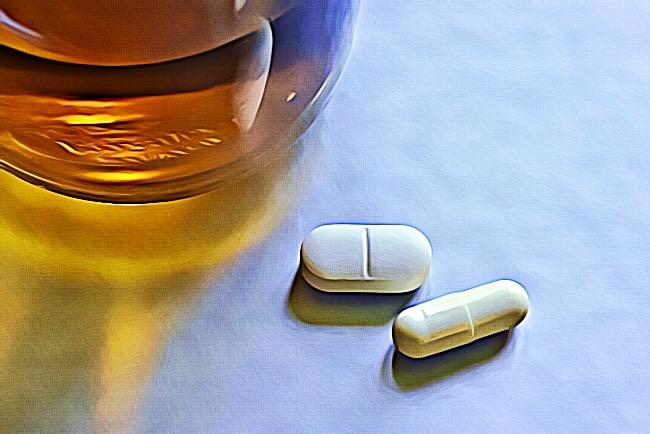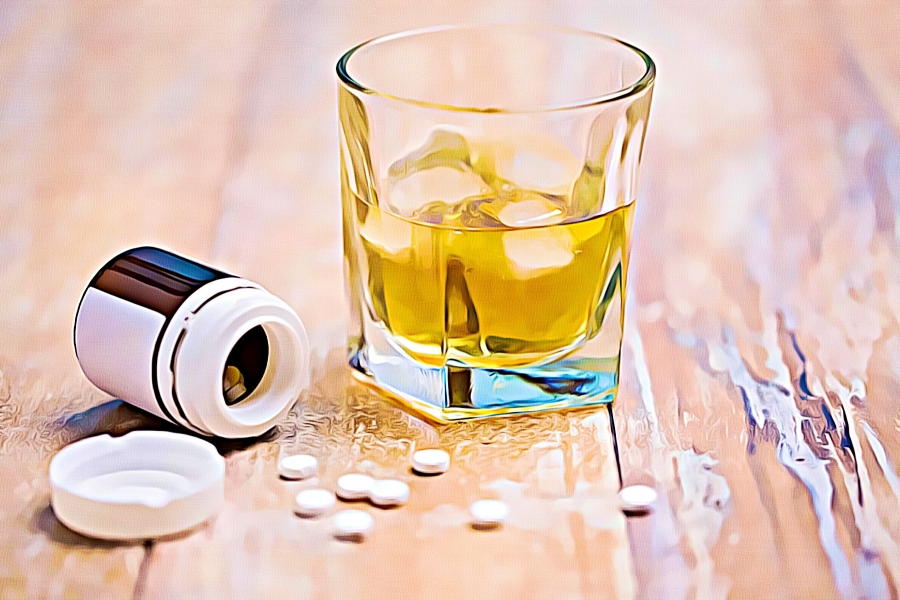The question of whether it is safe to consume alcohol while taking valacyclovir is a common one. Valacyclovir is an antiviral medication, and drinking alcohol while taking it could have harmful side effects. It is crucial to speak to a doctor before consuming alcohol while taking valacyclovir.
It’s quite possible that in the course of managing herpes outbreaks, you’ll find yourself in a situation in which there is alcohol present. Valacyclovir requires consistent use, so even if you do have a drink, it’s important to continue taking it to maximize the effectiveness of the medication.
Regrettably, the adverse effects of taking valacyclovir can be hard to deal with, and if alcohol is consumed in excess, these difficulties are only made worse. These may include feeling sick in the stomach, dizziness, headaches, vomiting, nausea, and unwellness. Even if you do not have a herpes outbreak, drinking alcohol during Valacyclovir treatment can make the side effects worse and lead to embarrassing or regrettable situations.
Consuming alcohol, especially in large amounts, can also reduce the effectiveness of your immune system, making it more difficult for your body to fight off a herpes outbreak. This can slow down the healing process and lessen the effectiveness of valacyclovir as a treatment for herpes.
What Happens When Valacyclovir and Alcohol Are Mixed
Valacyclovir is a medication, and it is vital to be aware of the potential risks associated with it and take steps to ensure that it is used safely. This includes consulting your doctor before taking it and following their instructions, as well as being aware of any potential side effects and taking measures to prevent them.
Consuming alcohol in moderation may be acceptable; however, there is a chance that it could aggravate any potential side effects of taking the medication. Drinking alcohol while taking Valacyclovir might lead to an increase in nausea and vomiting, which could make you feel worse. Other adverse reactions, such as tiredness and lightheadedness, could become more intense.
Stress is linked to increased occurrences of herpes outbreaks. When people feel stressed, they often turn to alcohol, which can impede the body’s healing process and make it harder for it to fight off the herpes virus.
It is advisable to abstain from drinking alcohol if you are taking valacyclovir, as there is not enough evidence to support the long-term effects of alcohol consumption on antiviral medications.
Understanding Valacyclovir
Valacyclovir, which goes by the brand name Valtrex, has been around since 1995 and is used to treat oral and genital herpes simplex, shingles, and chickenpox in youngsters. It is a popular choice for these conditions.
Valacyclovir is a medication meant to suppress outbreaks of herpes simplex type 1 and type 2. It is not a cure, but it can help to lessen the severity and frequency of attacks. Individuals who experience frequent herpes symptoms may find relief by taking a regular, lower dose of valacyclovir over a prolonged period.
Valacyclovir works by preventing the virus from spreading and allows the body to heal quicker. This drug is taken orally and is changed into a different form of the active ingredient once it’s in the body, which is called a prodrug. Studies have found that the prodrug form of this medication is more effective than the original active ingredient since more of it survives the liver’s filtering system.
It has been discovered that those who are infected with HSV 2, which causes genital herpes, have a 50 percent lower risk of transmitting the virus to their partners when they take valacyclovir, as opposed to those who do not take the medication. Taking it as soon as you start to experience signs of an outbreak may help reduce the duration and severity of the episode. It usually begins to work in the first 48 to 72 hours after ingestion.

The Proper Way to Take Valacyclovir
Valacyclovir is a prodrug, which means it is converted into an active form in the body. Valacyclovir falls under a class of drugs called nucleoside analog reverse transcriptase inhibitors (NRTIs) and works by inhibiting the replication of the virus.
Valacyclovir is typically taken in pill form, and it is essential to follow the directions on the prescription label carefully and take the medication as prescribed. Valacyclovir should be taken with food or a full glass of water to help prevent stomach upset. It is vital to take valacyclovir at the same time each day.
Valacyclovir should be taken for the entire course of treatment. It is important to take all doses, even if the symptoms have gone away. Stopping the medication early can cause the virus to become resistant to the drug, making it more difficult to treat.
It’s essential to adhere to your physician’s orders and take any prescribed drugs according to their instructions. If you have genital herpes that keeps coming back, you can take medicine twice a day in a smaller amount of 500 milligrams. Take note of the following side effects you may experience:
- Abdominal pain
- Constipation
- Dizziness
- Nausea
- Rash
The Potential Risks of Valacyclovir
- Age
Valacyclovir has not been studied in children 12 years old or younger with cold sores or in children 2 years old or younger with chickenpox, so the safety and effectiveness of this medication in these groups are unknown.
Additionally, research into the use of valacyclovir in elderly patients has not revealed any issues that would make it unsuitable for them. However, since older adults may be more prone to have age-related kidney problems, their doses of valacyclovir may need to be adjusted according to their individual needs.
- Allergies
It is important to tell your doctor or health care professional if you have ever had an unusual or allergic reaction to any medication, either prescription or over-the-counter, or if you have any allergies to foods, dyes, preservatives, or animals. Be sure to read the labels of any non-prescription products carefully before using them.
While it is generally well tolerated, some people may experience an allergic reaction to valacyclovir. The most common signs of an allergic reaction to valacyclovir are skin rash, hives, itching, and difficulty breathing. If you develop any of these symptoms after taking valacyclovir, you should stop taking the medication and contact your doctor as soon as possible.
- Breastfeeding
Before taking this medication while breastfeeding, consider the potential benefits and risks. There isn’t enough research available to determine the effects on infants if the drug is taken while breastfeeding, so it’s important to weigh the potential pros and cons before making a decision.
- Medications
It is possible for certain medications to interact when taken together. In these instances, your healthcare provider may need to adjust the dosage or take other precautions. When taking this medicine, it is essential to let your doctor know if you are taking any other medications.
Conclusion
In conclusion, it is advised to avoid combining valacyclovir and alcohol. While the drug is generally safe, there are some potential side effects, including sleepiness and dizziness. Alcohol can also cause these effects, and when taken together, they can be intensified.
Additionally, combining valacyclovir and alcohol can increase the risk of adverse reactions, such as liver damage and gastrointestinal problems. Therefore, it is best to avoid consuming alcohol while taking valacyclovir.

